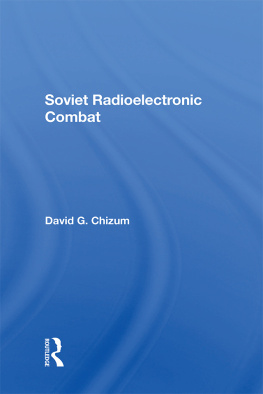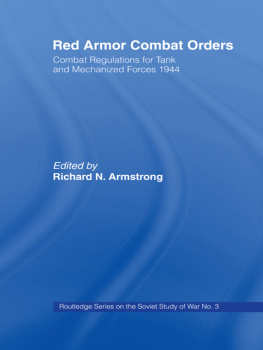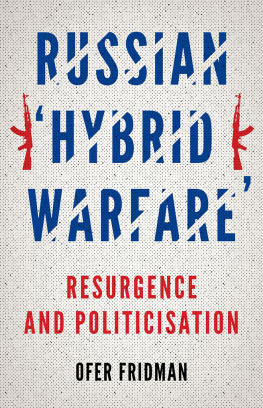Soviet Radioelectronic Combat
Westview Special Studies
The concept of Westview Special Studies is a response to the continuing crisis in academic and informational publishing. Library budgets are being diverted from the purchase of books and used for data banks, computers, micromedia, and other methods of information retrieval. Interlibrary loan structures further reduce the edition sizes required to satisfy the needs of the scholarly community. Economic pressures on university presses and the few private scholarly publishing companies have greatly limited the capacity of the industry to properly serve the academic and research communities. As a result, many manuscripts dealing with important subjects, often representing the highest level of scholarship, are no longer economically viable publishing projects--or, if accepted for publication, are typically subject to lead times ranging from one to three years.
Westview Special Studies are our practical solution to the problem. As always, the selection criteria include the importance of the subject, the work's contribution to scholarship, and its insight, originality of thought, and excellence of exposition. We accept manuscripts in camera-ready form, typed, set, or word processed according to specifications laid out in our comprehensive manual, which contains straightforward instructions and sample pages. The responsi- bility for editing and proofreading lies with the author or sponsoring institution, but our editorial staff is always available to answer questions and provide guidance.
The result is a book printed on acid-free paper and bound in sturdy library-quality soft covers. We manufacture these books ourselves using equipment that does not require a lengthy make-ready process and that allows us to publish first editions of 300 to 1000 copies and to reprint even smaller quantities as needed. Thus, we can produce Special Studies quickly and can keep even very specialized books in print as long as there is a demand for them.
About the Book and Author
Radioelectronic combat (REC) embraces the entire range of possibilities for manipulating the electromagnetic spectrum to military advantage. Options include electronic warfare, physical destruction of electronic targets, signals intelligence, and radioelectronic concealment and deception. Developed in the early 1970s by the Soviets, it is still poorly understood in the West. This study analyzes REC as a method of warfare with which Western military thinkers must reckon seriously at all levels of combat planning. It also provides a solid base of information on REC's origins, functional structure, and basic military goals. Equally important, it defines REC's greatest threat as conceptual rather than technological. Manipulating the electromagnetic spectrum depends more on thoughtful planning and centralized control than on sophisticated equipment; further, the Soviets appear to be ahead of the west in integrating the concept as an institutional part of military activity. Based primarily on Soviet sources, this book not only traces the evolution of REC but also serves as a model for understanding the development of other Soviet combat concepts.
David G. Chizum is an analyst at the Department of Defense.
Soviet Radioelectronic Combat
David G. Chizum
First published 1985 by Westview Press, Inc.
Published 2019 by Routledge
52 Vanderbilt Avenue, New York, NY 10017
2 Park Square, Milton Park, Abingdon, Oxon OX14 4RN
Routledge is an imprint of the Taylor & Francis Group, an informa business
Copyright 1985 Taylor & Francis
All rights reserved. No part of this book may be reprinted or reproduced or utilised in any form or by any electronic, mechanical, or other means, now known or hereafter invented, including photocopying and recording, or in any information storage or retrieval system, without permission in writing from the publishers.
Notice:
Product or corporate names may be trademarks or registered trademarks, and are used only for identification and explanation without intent to infringe.
Library of Congress Cataloging-in-Publication Data
Chizum, David
Soviet radioelectronic combat.
(Westview special studies in military affairs)
Bibliography: p.
1. Electronics in military engineering. 2. Soviet
Union--Armed Forces. I. Title. II. Series: Westview's
special studies in military affairs.
UG485.C47 1985 623'.043'0947 85-22545
ISBN 13: 978-0-367-28837-2 (hbk)
Dedication
As those who deal with unseen electromagnetic waves can testify, invisible does not mean unreal. Invisible phenomena can have decisive influence on the affairs of mankind. Just as receivers are needed to detect imperceptible radio waves, faith is required for seeing things spiritual. One great man of history who had such spiritual perception was Mases, who "by faith ... persevered because he saw Him who is invisible." Hebrews 11:27 (New International Version)
I choose to dedicate this book to all those who, over many years already past, have helped me--and others, too--to see with the eyes of faith the unseen realities of God that will last forever. They are the visionaries who, like Mases, looking toward a higher Power, can see beyond the fleeting realms of international politics and the temporary, artificial boundaries between peoples.
David G. Chizum
Few Americans who lived through the first generation of the Cold War could forget the radio commercials asking the public for contributions to support Radio Free Europe. One of the more memorable pitches featured the droning noises of Soviet radio jamming stations attempting to drown out the signals of Western broadcasting stations penetrating the Iron Curtain.
In the 1950's, to my pre-teenage mind, those haunting sounds represented the struggle between two competing ideologies, one good and one evil. It is a somewhat different world now, a generation later, but what I heard stuck with me. (The vividness of my early memories no doubt was enhanced by my discovery of Radio Moscow and other purveyors of propaganda on a short wave radio which I acquired in my late teens.)
In the broader view, it hardly matters that jamming of Western broadcasts has been reduced by Soviet bloc nations; or that factors other than political orientation, such as musical tastes, often guide the hands of Soviets and Eastern Europeans as they tune their radios; or that our CIA might not have been wearing a white hat while secretly funding Radio Free Europe and asking for public contributions at the same time. The two ideological opponents, standing on opposite sides of some very visible barriers, still exchange a continuous stream of invisible electronic barrages. It is a very real war of words being broadcast across their hostile borders.
This battle of unseen dimensions rages in peacetime but would intensify enormously should there came a time of war. Recently I became aware of the military side of this struggle of the airwaves. The Soviets choose to call it a radioelectronic struggle, better known as radioelectronic combat.
The Soviets have not been silent on the subject, nor have they concealed their intentions to exploit the endless potential of the electromagnetic spectrum, in war or peace. However, being quite security conscious, they characteristically have not spelled out the intricate details of their wartime plans. To dig out some of those details from available Soviet literature presents a challenge answered only by determined research. It was worth a try.









